一般过去时-现在完成时和过去完成时
英语时态8种基本时态讲解.ppt课件

8.过去完成时 表示动作发生在过去某一时间之前已经完成的动作或状态, 强调“过去的过去”, 常与 by the time, by the end of…,before , by 等引导时间的状语连用。
基本结构 主语+ had + 动词过去分词 + 其他成分 When I got to the cinema yesterday the film had begun already. He had learned English before he came here.
现在完成时与一般过去时的区别: 1)现在完成时侧重于对现在的影响;而一般过去时侧重于某一动作发生在过去某个时间或某段时间。即现在完成时侧重于现在的结果,而一般过去时侧重于动作发生的时间。例如:
I have seen the film. 我看过这部电影。(现在我仍记得电影的内容) I saw the film three days ago. 三天前我看了这部电影。(强调是三天前,而不是别的什么时候看的电影)
be going to含有“打算,准备”的意思,而will则没有这个意思, She is going to lend us her book. He will be here in half an hour.
be about to+V.原形(意为马上做某事,在时间上指最近的将来) I am about to leave school. 不能与表示时间的副词连用。 They are about to set out.(√) They are about to set,变y为i加-ed. study----studied carry----carried cry----cried try----tried d)以元音字母+y结尾的单词直接加-ed. play----played stay----stayed
16种英语时态总结归纳

时态(Tense)是表示行为、动作和状态在各种时间条件下的动词形式。
因此,当我们说时态结构的时候,指的是相应时态下的动词形式。
英语时态分为16种:一般现在、一般过去、一般将来、过去将来时,以及这四者的进行时、完成时和完成进行时。
1. 一般现在时用法:A) 表示现在发生的动作、情况、状态和特征。
B) 习惯用语。
C) 经常性、习惯性动作。
例:He always helps others. (他总是帮助别人。
)D) 客观事实和普遍真理。
尤其要注意,如果前后文不是一般现在时,则无法保持主句、从句时态一致。
E) 表示一个按规定、计划或安排要发生的动作,(仅限于某些表示“来、去、动、停、开始、结束、继续”等的动词)可以与表示未来时间的状语搭配使用。
常见的用法是:飞机、火车、轮船、汽车等定期定点运行的交通方式。
例:The next train leaves at 3 o'clock this afternoon.(下一趟火车今天下午3点开车。
)How often does this shuttle bus run? (这班车多久一趟?)F) 在时间和条件状语从句里经常用一般现在(有时也用现在完成时)表示将来事情。
例:When you have finished the report, I will have waited for about 3 hours.(等你完成这份报告的时候,我就已经等了将近3个小时了。
)2. 现在进行时(be doing)用法:现在正在进行的动作。
3. 现在完成时(have done)用法:A) 表示动作到现在为止已经完成或刚刚完成。
例:I bought a new house, but I _________ my old one yet, so at the moment I have two houses.A) didn't sell B) sold C) haven't sold D) would sell答案是C) haven't sold。
英语八种时态讲解及练习

现在进行时
作谓语的动词用来表示动作(情况) 发生时间的各种形式称为时态。
1.概念:表示现阶段或说话时正在 进行的动作及行为。 2.时间状语:Now, at this time, days, look. listen等时间状语做标志。 3.基本结构:主语+be +doing +其 他 4.否定形式:主语+be +not +doing+ 其他 5.一般疑问句:把be动词放于句首。
现在分词的变法有
1)、一般在动词词尾加上-ing ,E.g. jump 2)、以不发音字母e结尾的动词,先 去e,再加-ing. E.g have write 3)、.以重读闭音节末尾只有一个辅 音字母结尾的词,它前面是单个元 音字母时要先将词尾的辅音字母双 写,再加上-ing. E.g. sit put 其句式 变换都在be上做文章。
10. I will go there when I _____(have, will have, has) time tomorrow. 11. He won’t come to the party unless he _____(be, will be, am, is, are) invited. 12. I’ll wait here until my mother ____(come, comes, will come) back. 13. Please return the book to the library as soon as you ______(finish, finishes, will finish) reading it. 14. Once you _____(see, sees, will see) him, you will never forget him.
初三英语时态汇总(一般现在时、一般将来时、一般过去时和现在进行时、过去进行时、现在完成时、过去完成时)
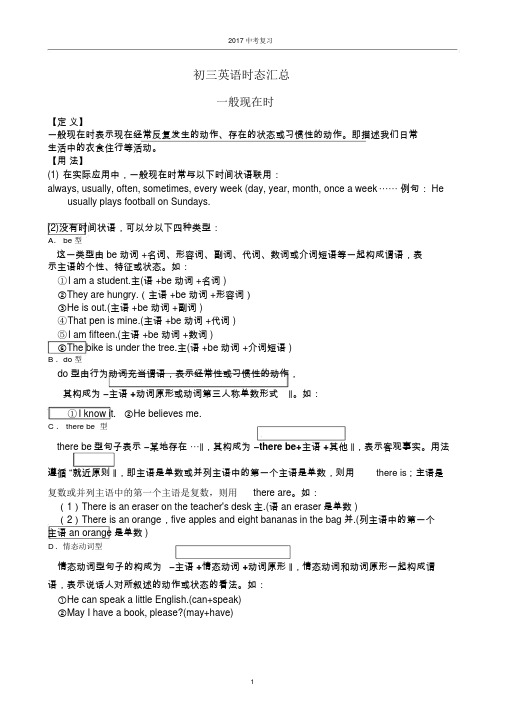
2017 中考复习初三英语时态汇总一般现在时【定义】一般现在时表示现在经常反复发生的动作、存在的状态或习惯性的动作。
即描述我们日常生活中的衣食住行等活动。
【用法】(1)在实际应用中,一般现在时常与以下时间状语联用:always, usually, often, sometimes, every week (day, year, month, once a week⋯⋯例句: He usually plays football on Sundays.(2)没有时间状语,可以分以下四种类型:A. be 型这一类型由 be 动词 +名词、形容词、副词、代词、数词或介词短语等一起构成谓语,表示主语的个性、特征或状态。
如:①I am a student.主(语 +be 动词 +名词 )②They are hungry.(主语 +be 动词 +形容词)③He is out.(主语 +be 动词 +副词 )④T hat pen is mine.(主语 +be 动词 +代词 )⑤I am fifteen.(主语 +be 动词 +数词 )⑥The bike is under the tree.主(语 +be 动词 +介词短语 )B .do 型do 型由行为动词充当谓语,表示经常性或习惯性的动作,其构成为―主语 +动词原形或动词第三人称单数形式‖。
如:①I know it. ②He believes me.C . there be型there be型句子表示―某地存在⋯‖,其构成为―there be+主语+其他‖,表示客观事实。
用法遵循“就近原则‖,即主语是单数或并列主语中的第一个主语是单数,则用there is;主语是复数或并列主语中的第一个主语是复数,则用there are。
如:(1)There is an eraser on the teacher's desk主.(语 an eraser是单数 )(2)There is an orange,five apples and eight bananas in the bag并.(列主语中的第一个主语 an orange是单数 )D.情态动词型情态动词型句子的构成为―主语+情态动词+动词原形‖,情态动词和动词原形一起构成谓语,表示说话人对所叙述的动作或状态的看法。
一般过去时-现在完成时和过去完成时
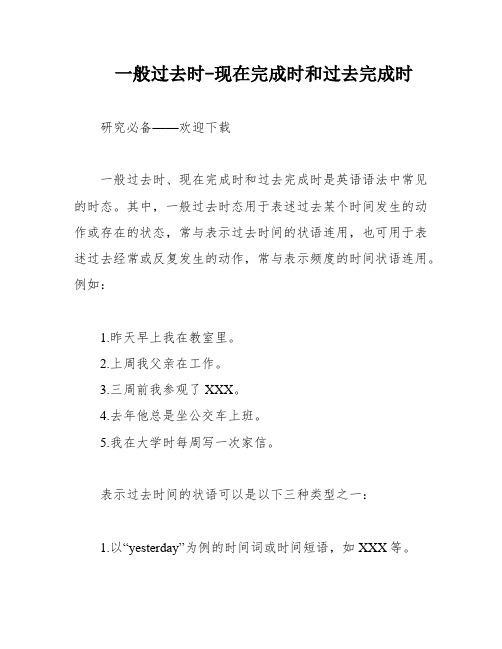
一般过去时-现在完成时和过去完成时研究必备——欢迎下载一般过去时、现在完成时和过去完成时是英语语法中常见的时态。
其中,一般过去时态用于表述过去某个时间发生的动作或存在的状态,常与表示过去时间的状语连用,也可用于表述过去经常或反复发生的动作,常与表示频度的时间状语连用。
例如:1.昨天早上我在教室里。
2.上周我父亲在工作。
3.三周前我参观了XXX。
4.去年他总是坐公交车上班。
5.我在大学时每周写一次家信。
表示过去时间的状语可以是以下三种类型之一:1.以“yesterday”为例的时间词或时间短语,如XXX等。
2.由“last+时间名词”构成的短语,如last night。
last year (winter。
month。
week)等。
3.由“时间段+ago”构成的短语,如a moment ago。
a short time ago。
an hour ago等。
现在完成时态用于表述过去发生或已经完成的动作对现在造成的影响或结果,常与already,just,yet,before,ever,never等副词连用。
此外,现在完成时态还可用于表述发生在过去某一时刻的、持续到现在的动作(用行为动词表示)或状态(用be动词表示),常与for(+时间段)、since(+时间点或过去时的句子)连用。
例如:1.我父亲给我带了很多书,所以我现在可以阅读一些了。
2.我已经完成了作业,所以我现在可以交给老师了。
3.XXX还没看过这部电影,所以他对它没有什么可说的。
4.这是我看过的最棒的电影。
5.XXX已经病了三天了。
过去完成时态用于表述过去某个时间点之前已经完成的动作,常与by(+时间点)、before等连用。
例如:1.我已经吃过早饭了,当我到达办公室时。
2.我已经看过这部电影了,当它在电视上播出时。
3.她已经离开了,当我到达机场时。
以上三种时态在英语语法中都有着重要的作用,学好它们对于掌握英语语言和文化都至关重要。
欢迎下载我们的研究必备资料,更好地研究这些时态。
一般过去时、现在完成时与过去完成时

The teacher asked if you _h__a_d__b_e_e_n___ ( be ) to the Great Wall?
一、单项选择
1. I happened __D___ him in the park yester
day. A. meet
B. meeting
C. met
D. to meet
2. Have you ever invited a friend __C__ your school?
A. for
B. with
1.一般过去时表示在过去某时发生的动作 或存在的状态。
例:We started to learn English 5 years ago.
我们五年前开始学英语。
5 years ago
now
2. 现在完成时表示的动作发生在过去,但侧 重对现在产生的结果或造成的影响,与现在 有关。其结构为:“助动词 have(has)+ 过 去分词” 。 例:We have learned English for 5 years.
-- Forget it, it’s a ____B____.
A. fool
B. hoax
C. pleasure
D. risk
5. Johnny announced that he would never
__C___ before finding a satisfying job.
英语十六种时态总结
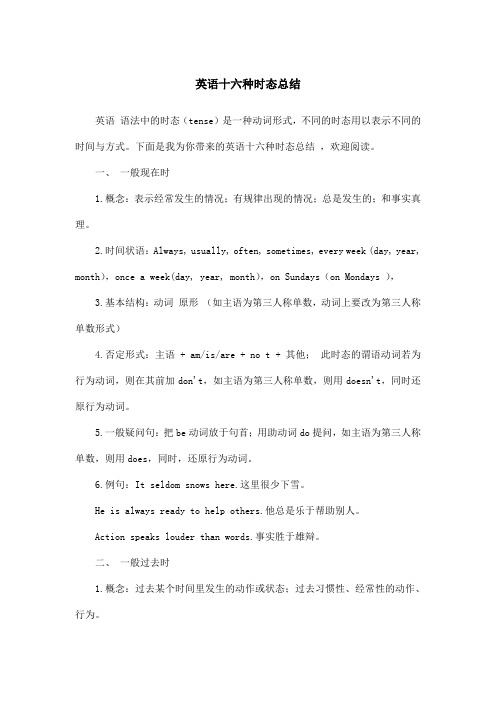
英语十六种时态总结英语语法中的时态(tense)是一种动词形式,不同的时态用以表示不同的时间与方式。
下面是我为你带来的英语十六种时态总结,欢迎阅读。
一、一般现在时1.概念:表示经常发生的情况;有规律出现的情况;总是发生的;和事实真理。
2.时间状语:Always, usually, often, sometimes, every week (day, year, month),once a week(day, year, month),on Sundays(on Mondays ),3.基本结构:动词原形(如主语为第三人称单数,动词上要改为第三人称单数形式)4.否定形式:主语 + am/is/are + no t + 其他;此时态的谓语动词若为行为动词,则在其前加don't,如主语为第三人称单数,则用doesn't,同时还原行为动词。
5.一般疑问句:把be动词放于句首;用助动词do提问,如主语为第三人称单数,则用does,同时,还原行为动词。
6.例句:It seldom snows here.这里很少下雪。
He is always ready to help others.他总是乐于帮助别人。
Action speaks louder than words.事实胜于雄辩。
二、一般过去时1.概念:过去某个时间里发生的动作或状态;过去习惯性、经常性的动作、行为。
2.时间状语:ago, yesterday, the day before yesterday, last week, last(year, night, month),in 1989,just now, at the age of 5,one day, long long ago, once upon a time, etc.3.基本结构:主语 + 动词的过去式或be的过去式+名词4.否定形式:主语 + was/were + not + 其他;在行为动词前加didn't,同时还原行为动词。
[全]一般过去时态、现在完成时态、过去完成时态之间的区别
![[全]一般过去时态、现在完成时态、过去完成时态之间的区别](https://img.taocdn.com/s3/m/862ac497e45c3b3566ec8b27.png)
一般过去时态、现在完成时态、过去完成时态之间的本质区别本文将回答以下五个问题:1.一般过去时态和现在完成时态的本质区别是什么?2.一般过去时态和过去完成时态的本质区别是什么?3.现在完成时态和过去完成时态的本质区别是什么?4.现在完成时态能够和表示具体的过去时间连用吗?5.过去完成时态能够和表示具体的过去时间连用吗?一、一般过去时态一般过去时态的时间是“过去”,谓语形态——did do,时间助动词did是过去形。
一般过去时态是以现在时间为参考基准的过去,就是现在时间之前的动作状态,一般过去时态的时间区间(时间作用域)如下图所示:图1 一般过去时态时间作用域例句:I lost my key.我钥匙丢了。
图2 一般过去时态示例说明:钥匙过去时间丢的,现在也许已经找到了,对现在没影响。
一般过去时态本质上是“过去”的时态,所以可以接“确定”的过去时间。
二、现在完成时态现在完成时态的时间是“现在”,谓语形态——have done,时间助动词have 是现在形。
现在完成时态是以现在时间为参考基准的,就是到现在时间的动作状态,现在完成时态的时间区间(时间作用域)如下图所示:图3 现在完成时态时间作用域图3显示,虽然一个动作可能是在过去发生的,但是其时空作用域(时效性)对现在产生影响。
例句:I have lost my key.我钥匙丢了。
图4 现在完成时态示例说明:钥匙过去时间丢的,但是现在依旧没找到,对现在有影响。
现在完成时态本质上是“现在”的时态,所以不能接“确定”的过去时间。
三、过去完成时态过去完成时态的时间是“过去”,谓语形态——had done, 时间助动词had是过去形。
过去完成时态是以过去时间为参考基准的,就是到过去时间的动作状态,过去完成时态的时间区间(时间作用域)如下图所示:图5 过去完成时态时间作用域图5显示,虽然一个动作可能是在过去的过去发生的,但是其时空作用域(时效性)对过去产生影响。
现在完成时、一般过去时、过去完成时
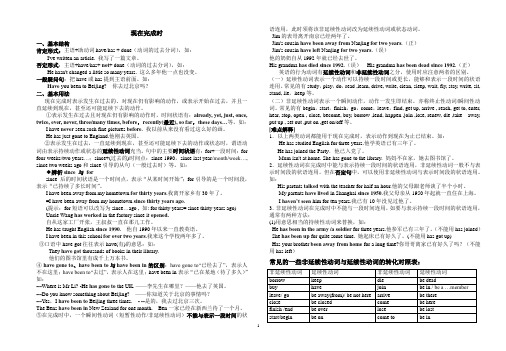
现在完成时一、基本结构肯定形式:主语+助动词have/has + done(动词的过去分词),如:I've written an article. 我写了一篇文章。
否定形式:主语+have/has+ not+ done(动词的过去分词),如:He hasn't changed a little so many years. 这么多年他一点也没变。
一般疑问句:把have或has提到主语前面。
如:Have you been to Beijing? 你去过北京吗?二、基本用法现在完成时表示发生在过去的、对现在仍有影响的动作,或表示开始在过去,并且一直延续到现在,甚至还可能延续下去的动作。
①表示发生在过去且对现在仍有影响的动作时,时间状语有:already, yet, just, once, twice, ever, never, three/many times, before,recently(最近), so far,these days…等。
如:I have never seen such fine pictures before. 我以前从来没有看过这么好的画。
He has just gone to England.他刚去英国。
②表示发生在过去,一直延续到现在,甚至还可能延续下去的动作或状态时,谓语动词由表示持续动作或状态的延续性动词充当。
句中的主要时间状语有:for+一段时间:for four weeks/two years…;since+(过去的)时间点:since 1990,since last year/month/week…, since two weeks ago和since引导的从句(一般过去时)等。
如:◆辨析since 与forsince 后的时间状语是一个时间点,表示“从某时间开始”;for引导的是一个时间段,表示“已持续了多长时间”。
I have been away from my hometown for thirty years.我离开家乡有30年了。
时态和语态(一般现在时;一般过去时;现在完成时;过去完成时)

时态和语态
一般现在时/一般过去时 现在进行时/过去时行时 现在完成时/过去完成时
动词时态的进行体(现在时行时/ 过去进行时)
1.现在进行时、过去m/is/are+现在分词
过去进行时
2.现在分词的构成形式:
was/were+现在分词
用法
例句
They are having an English class now.
3.Your experiment report is being typed (type) now and it will be finished soon.
4.It is reported in the newspaper that several new subway lines are being built(build)
表示按计划、安排要做 的动作,常与表示将来
Are you staying in Guangzhou 下周你将待在广州吗?
next
week?
的时间状语连用
I am taking my daughter to go to kindergarten. 我将带我女儿去幼儿园。
They were talking about the accident 表示过去某一时刻或某 when I walked into the classroom. 一阶段正在进行的动作 我进教室的时候他们正在讨论那场事
表示现在(说话人说话 他们正在上英语课。
时)正在发生的动作或 We are waiting for you
存在的状态
now.
我们正在等你。
现在 进行时
表示现阶段正在发生的 动作,说话时该动作未
George is writing a novel. 乔治正在写一部小说。
一般过去进与现在完成时与过去完成时的区别
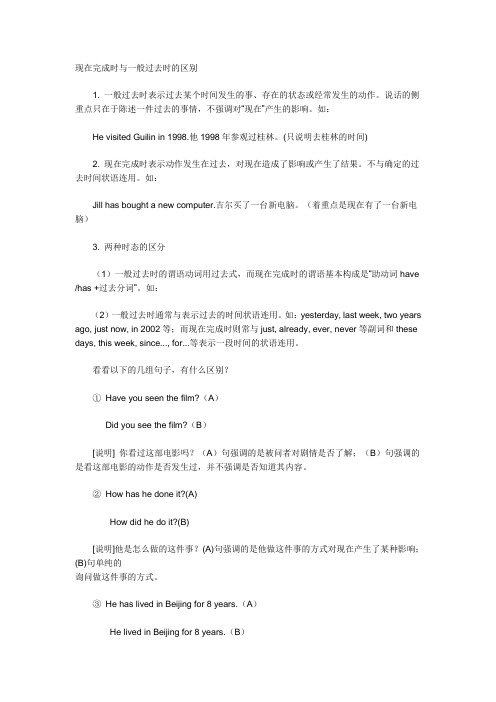
现在完成时与一般过去时的区别1. 一般过去时表示过去某个时间发生的事、存在的状态或经常发生的动作。
说话的侧重点只在于陈述一件过去的事情,不强调对“现在”产生的影响。
如:He visited Guilin in 1998.他1998年参观过桂林。
(只说明去桂林的时间)2. 现在完成时表示动作发生在过去,对现在造成了影响或产生了结果。
不与确定的过去时间状语连用。
如:Jill has bought a new computer.吉尔买了一台新电脑。
(着重点是现在有了一台新电脑)3. 两种时态的区分(1)一般过去时的谓语动词用过去式,而现在完成时的谓语基本构成是“助动词have /has +过去分词”。
如:(2)一般过去时通常与表示过去的时间状语连用。
如:yesterday, last week, two years ago, just now, in 2002等;而现在完成时则常与just, already, ever, never等副词和these days, this week, since..., for...等表示一段时间的状语连用。
看看以下的几组句子,有什么区别?①Have you seen the film?(A)Did you see the film?(B)[说明] 你看过这部电影吗?(A)句强调的是被问者对剧情是否了解;(B)句强调的是看这部电影的动作是否发生过,并不强调是否知道其内容。
②How has he done it?(A)How did he do it?(B)[说明]他是怎么做的这件事?(A)句强调的是他做这件事的方式对现在产生了某种影响;(B)句单纯的询问做这件事的方式。
③He has lived in Beijing for 8 years.(A)He lived in Beijing for 8 years.(B)[说明]他在北京住了8年。
(A)句讲的是到目前为止他在北京住了8年,可能还会继续在北京住下去。
英语八大时态
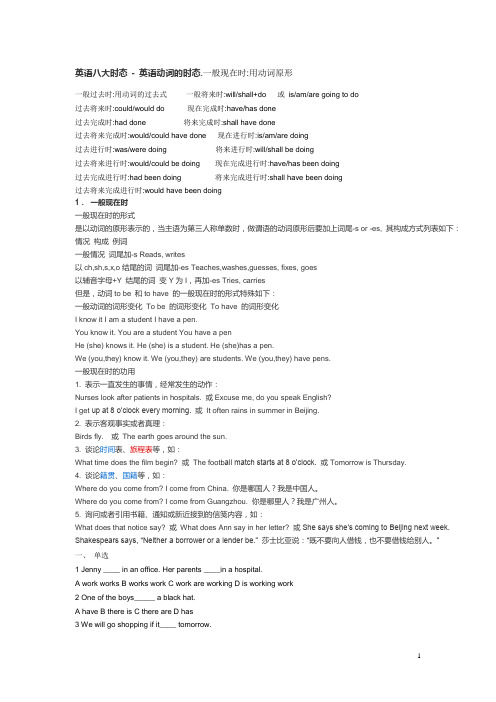
英语八大时态- 英语动词的时态.一般现在时:用动词原形一般过去时:用动词的过去式一般将来时:will/shall+do 或is/am/are going to do过去将来时:could/would do 现在完成时:have/has done过去完成时:had done 将来完成时:shall have done过去将来完成时:would/could have done 现在进行时:is/am/are doing过去进行时:was/were doing 将来进行时:will/shall be doing过去将来进行时:would/could be doing 现在完成进行时:have/has been doing过去完成进行时:had been doing 将来完成进行时:shall have been doing过去将来完成进行时:would have been doing1.一般现在时一般现在时的形式是以动词的原形表示的,当主语为第三人称单数时,做谓语的动词原形后要加上词尾-s or -es, 其构成方式列表如下:情况构成例词一般情况词尾加-s Reads, writes以ch,sh,s,x,o结尾的词词尾加-es Teaches,washes,guesses, fixes, goes以辅音字母+Y 结尾的词变Y为I,再加-es Tries, carries但是,动词to be 和to have 的一般现在时的形式特殊如下:一般动词的词形变化To be 的词形变化To have 的词形变化I know it I am a student I have a pen.You know it. You are a student You have a penHe (she) knows it. He (she) is a student. He (she)has a pen.We (you,they) know it. We (you,they) are students. We (you,they) have pens.一般现在时的功用1. 表示一直发生的事情,经常发生的动作:Nurses look after patients in hospitals. 或Excuse me, do you speak English?I get up at 8 o’clock every morning. 或It often rains in summer in Beijing.2. 表示客观事实或者真理:Birds fly. 或The earth goes around the sun.3. 谈论时间表、旅程表等,如:What time does the film begin? 或The footb all match starts at 8 o’clock. 或Tomorrow is Thursday.4. 谈论籍贯、国籍等,如:Where do you come from? I come from China. 你是哪国人?我是中国人。
一般过去时,现在完成时,过去完成时的用法及区别
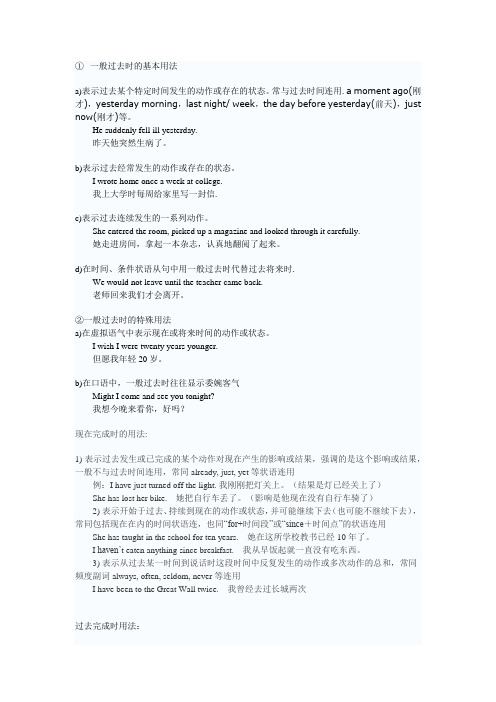
①一般过去时的基本用法a)表示过去某个特定时间发生的动作或存在的状态。
常与过去时间连用. a moment ago(刚才),yesterday morning,last night/ week,the day before yesterday(前天),just now(刚才)等。
He suddenly fell ill yesterday.昨天他突然生病了。
b)表示过去经常发生的动作或存在的状态。
I wrote home once a week at college.我上大学时每周给家里写一封信.c)表示过去连续发生的一系列动作。
She entered the room, picked up a magazine and looked through it carefully.她走进房间,拿起一本杂志,认真地翻阅了起来。
d)在时间、条件状语从句中用一般过去时代替过去将来时.We would not leave until the teacher came back.老师回来我们才会离开。
②一般过去时的特殊用法a)在虚拟语气中表示现在或将来时间的动作或状态。
I wish I were twenty years younger.但愿我年轻20岁。
b)在口语中,一般过去时往往显示委婉客气Might I come and see you tonight?我想今晚来看你,好吗?现在完成时的用法:1) 表示过去发生或已完成的某个动作对现在产生的影响或结果,强调的是这个影响或结果,一般不与过去时间连用,常同already, just, yet等状语连用例:I have just turned off the light. 我刚刚把灯关上。
(结果是灯已经关上了)She has lost her bike.她把自行车丢了。
(影响是他现在没有自行车骑了)2) 表示开始于过去、持续到现在的动作或状态,并可能继续下去(也可能不继续下去),常同包括现在在内的时间状语连,也同“for+时间段”或“since+时间点”的状语连用She has taught in the school for ten years.她在这所学校教书已经10年了。
一般现在时,一般过去时,一般将来时及现在进行时
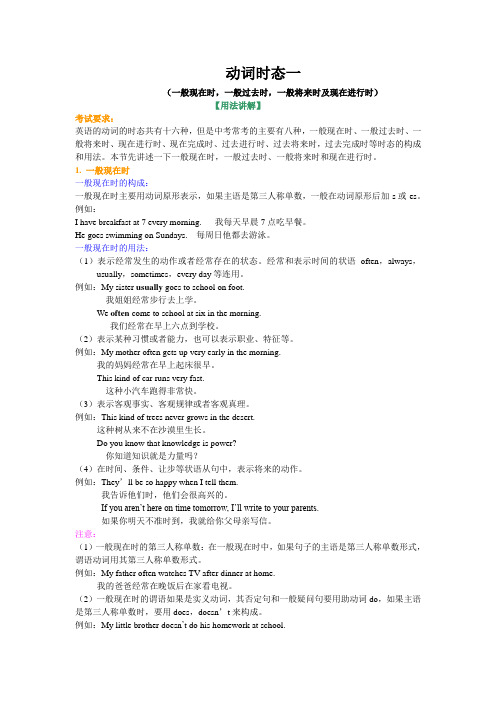
动词时态一(一般现在时,一般过去时,一般将来时及现在进行时)【用法讲解】考试要求:英语的动词的时态共有十六种,但是中考常考的主要有八种,一般现在时、一般过去时、一般将来时、现在进行时、现在完成时、过去进行时、过去将来时,过去完成时等时态的构成和用法。
本节先讲述一下一般现在时,一般过去时、一般将来时和现在进行时。
1. 一般现在时一般现在时的构成:一般现在时主要用动词原形表示,如果主语是第三人称单数,一般在动词原形后加-s或-es。
例如:I have breakfast at 7 every morning. 我每天早晨7点吃早餐。
He goes swimming on Sundays. 每周日他都去游泳。
一般现在时的用法:(1)表示经常发生的动作或者经常存在的状态。
经常和表示时间的状语often,always,usually,sometimes,every day等连用。
例如:My sister usually goes to school on foot.我姐姐经常步行去上学。
We often come to school at six in the morning.我们经常在早上六点到学校。
(2)表示某种习惯或者能力,也可以表示职业、特征等。
例如:My mother often gets up very early in the morning.我的妈妈经常在早上起床很早。
This kind of car runs very fast.这种小汽车跑得非常快。
(3)表示客观事实、客观规律或者客观真理。
例如:This kind of trees never grows in the desert.这种树从来不在沙漠里生长。
Do you know that knowledge is power?你知道知识就是力量吗?(4)在时间、条件、让步等状语从句中,表示将来的动作。
例如:They’ll be so happy when I tell them.我告诉他们时,他们会很高兴的。
英语四种时态顺口溜

英语四种时态顺口溜英语四种时态顺口溜小学英语中最常见的四种时态分别是:一般现在时、一般过去时、现在进行时和一般将来时。
在教学中如果只是单纯的去讲有关的语法知识,不仅枯燥,而且也不利于学生的理解,如果把它融于顺口溜中,会极大地调动起学生的兴趣。
1、现在进行时:动作正进行,要用进行时。
主语在句首,am is are 跟在后,现在分词跟着走,其他成分不可丢。
一般问句这样变,把be提到句前去,否定句式也简单,be后只把not加。
2、一般现在时:现在经常做的事,要用一般现在时。
第三人称作主语,动词后面加s/es。
其它人称作主语,动词只需用原形。
3、一般将来时不久将要发生事,记住要用将来时。
Be 加going to,后面跟着动原形。
Be的形式要记住,随着主语随时变。
还有一种表达法,will后要加动原形。
4、一般过去时事情已发生,要用一般过去时主语在句首,后面跟着动词过去式。
动词过去式,变化有规律,还有特殊变化要牢记。
一般现在时现在经常做的事,记住主语、结构和特征。
“是”有三变要记请,它们就是“am, is ,are,一般动词见she, he ,it,不忘后面加s/es,其它一律用原形,还有have和has, 看着“人”来用。
表示“某地有”,别忘there be , be要随着主语变。
一般将来时不久将要发生事,记住要用将来时。
be加going to , 后面跟着动原形,be的形式要记住,随着主语及时变。
还有一种表达法,will后要加动原形。
现在进行时正在做的事,be加动词ing,变疑问,be提前,be的形式有三变,就是am , is , are, 要用哪一个,看谁作主语。
一般过去时事情已发生,动词用过去,动词过去式,变化有规律,一般动词后面加ed ; be用 was或者were ,have , has变 had , 见到不发音字母 e 结尾,直接加 d 就可以;辅音字母加 y 来结尾,变 y 为 i 别忘加 ed ; 重读闭音节双写尾字母,后面还要加ed .其它特殊变化要牢记。
英语8个时态及公式

英语8个时态及公式
英语中8种时态的结构分别是一般现在时、一般过去时、现在进行时、过去进行时、现在完成时、过去完成时、一般将来时和过去将来时。
一般现在时是主语+do/does(现在分词);一般过去时是主语+did;现在进行时是主语+am/is/are doing。
过去进行时:was/were doing
现在完成时:have/has done
过去完成时:had done
一般将来时:will do
过去将来时:was/were to /would do
一般现在时常常、反复发生的动作或行为及现在的某种状况。
一般过去时过去某个时间里发生的动作或状态;过去习惯性、常常性的动作、行为。
现在进行时表示现阶段或说话时正在进行的动作及行为。
过去进行时表示过去某段时间或某一时刻正在发生或进行的行为或动作。
现在完成时过去发生或已经完成的动作对现在造成的影响或结果,或从过去已经开头,持续到现在的动作或状态。
过去完成时以过去某个时间为标准,在此以前发生的动作或行为,或在过去某动作之前完成的行为,即“过去的过去”。
一般将来时表示将要发生的动作或存在的状态及准备、方案或预备做某事。
过去将来时表示从过去某一时间看的将要发生的动作或存在的状态及准备、方案或预备做某事。
一般过去式和过去完成时以及现在完成时

Past Perfect
1. We use Past Perfect to talk about an event or situation in the past which happened before other past events. Before my father moved to America, he had never met a foreigner.
一动作之前完成的动作或状态。强调过去 某一动作发生在另一动作之前。
He said that he had met you before.
By six o’clock they had worked for eight hours.
2. 在told, said, knew, heard, thought等动词后 的宾语从句。 She said (that) she had never been to Paris.
例如: I have lived here since I was born.
过去完成时标志词 three days before, by the end of last year 例: I had finished my training by the end of last year.
Past Simple: an event in the past
Before their father took them to a cinema in 1955, they hadn't seen a movie. We hadn't even arrived at the airport when our plane took off.
一般过去时、现在完成时、过去完成时复习
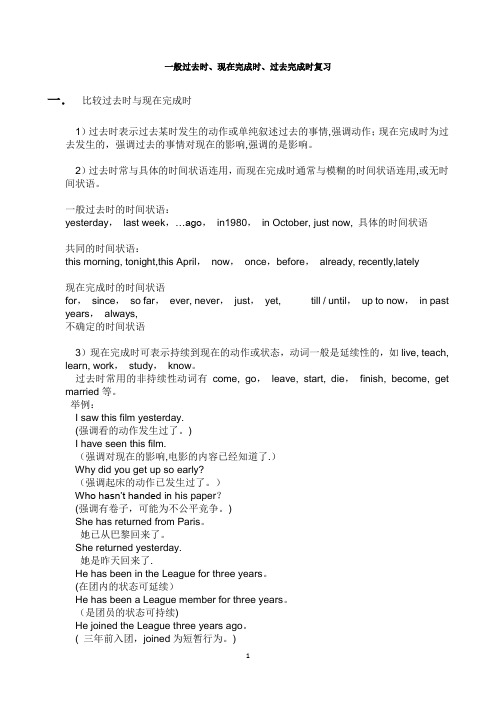
一般过去时、现在完成时、过去完成时复习一.比较过去时与现在完成时1)过去时表示过去某时发生的动作或单纯叙述过去的事情,强调动作;现在完成时为过去发生的,强调过去的事情对现在的影响,强调的是影响。
2)过去时常与具体的时间状语连用,而现在完成时通常与模糊的时间状语连用,或无时间状语。
一般过去时的时间状语:yesterday,last week,…ago,in1980,in October, just now, 具体的时间状语共同的时间状语:this morning, tonight,this April,now,once,before,already, recently,lately现在完成时的时间状语for,since,so far,ever, never,just,yet, till / until,up to now,in past years,always,不确定的时间状语3)现在完成时可表示持续到现在的动作或状态,动词一般是延续性的,如live, teach, learn, work,study,know。
过去时常用的非持续性动词有come, go,leave, start, die,finish, become, get married等。
举例:I saw this film yesterday.(强调看的动作发生过了。
)I have seen this film.(强调对现在的影响,电影的内容已经知道了.)Why did you get up so early?(强调起床的动作已发生过了。
)Who hasn’t handed in his paper?(强调有卷子,可能为不公平竞争。
)She has returned from Paris。
她已从巴黎回来了。
She returned yesterday.她是昨天回来了.He has been in the League for three years。
一般过去时-现在完成时和过去完成时
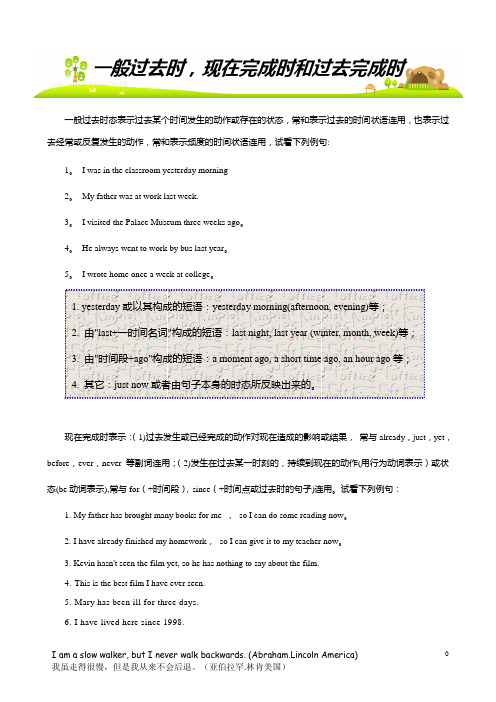
一般过去时,现在完成时和过去完成时一般过去时态表示过去某个时间发生的动作或存在的状态,常和表示过去的时间状语连用,也表示过去经常或反复发生的动作,常和表示频度的时间状语连用,试看下列例句:1。
I was in the classroom yesterday morning2。
My father was at work last week.3。
I visited the Palace Museum three weeks ago。
4。
He always went to work by bus last year。
5。
I wrote home once a week at college。
1. yesterday或以其构成的短语:yesterday morning(afternoon, evening)等;2. 由"last+一时间名词"构成的短语:last night, last year (winter, month, week)等;3. 由"时间段+ago"构成的短语:a moment ago, a short time ago, an hour ago等;4. 其它:just now或者由句子本身的时态所反映出来的。
现在完成时表示:(1)过去发生或已经完成的动作对现在造成的影响或结果,常与already,just,yet,before,ever,never 等副词连用;(2)发生在过去某一时刻的,持续到现在的动作(用行为动词表示)或状态(be动词表示),常与for(+时间段),since(+时间点或过去时的句子)连用。
试看下列例句:1.My father has brought many books for me ,so I can do some reading now。
2.I have already finished my homework,so I can give it to my teacher now。
- 1、下载文档前请自行甄别文档内容的完整性,平台不提供额外的编辑、内容补充、找答案等附加服务。
- 2、"仅部分预览"的文档,不可在线预览部分如存在完整性等问题,可反馈申请退款(可完整预览的文档不适用该条件!)。
- 3、如文档侵犯您的权益,请联系客服反馈,我们会尽快为您处理(人工客服工作时间:9:00-18:30)。
一般过去时,现在完成时和过去完成时一般过去时态表示过去某个时间发生的动作或存在的状态,常和表示过去的时间状语连用,也表示过去经常或反复发生的动作,常和表示频度的时间状语连用,试看下列例句:1. I was in the classroom yesterday morning2. My father was at work last week.3. I visited the Palace Museum three weeks ago.4. He always went to work by bus last year.5. I wrote home once a week at college.1. yesterday或以其构成的短语:yesterday morning(afternoon, evening)等;2. 由"last+一时间名词"构成的短语:last night, last year (winter, month, week)等;3. 由"时间段+ago"构成的短语:a moment ago, a short time ago, an hour ago等;4. 其它:just now或者由句子本身的时态所反映出来的。
现在完成时表示:(1)过去发生或已经完成的动作对现在造成的影响或结果, 常与already,just,yet,before,ever,never 等副词连用;(2)发生在过去某一时刻的,持续到现在的动作(用行为动词表示)或状态(be动词表示),常与for(+时间段),since(+时间点或过去时的句子)连用。
试看下列例句:1.My father has brought many books for me , so I can do some reading now.2.I have already finished my homework, so I can give it to my teacher now.3.Kevin hasn't seen the film yet, so he has nothing to say about the film.4.This is the best film I have ever seen.5.Mary has been ill for three days.6.I have lived here since 1998.现在完成时不能和表示过去的时间状语连用,如yesterday, last year, two days ago, just now 等等,但可以和already, yet, sometimes, always, before, recently,ever, never等连用。
I have met him before. 我从前曾见过他。
Ma Hong has always been a good student. 马红一直是个好学生。
I have often seen him in the street. 我经常在街上看见他。
They have never been to Beijing. 他们从未去过延安。
I haven't seen him recently. 我近来没看到他。
现在完成时既然可以表示从过去持续到现在,那么在延续性用法中,谓语动词必须为延续性的,而不可以和瞬间动词连用。
1.I have brought the book for ten days. ( × )2.They have already come here since three years ago. ( × )但是,在否定句中非延续性动词可以表示状态的延续,试看下列例句:1. I haven't seen her for a long time.2. He hasn't left home ever since he lost his job.过去完成时表示在过去某一时间或动作之前已经发生或完成了的动作,即“过去的过去”, 常与by,before 等词连用,也可以表示在过去某个时间或动作之前发生并一直持续到那个时间的动作或状态,常与just,already,for,since等时间副词连用,试看下列例句:By ten o'clock this morning, we had visited the Happy Valley.I had finished my piano lesson before nine yesterday evening.The film had begun before we got to the cinema.He had done his homework before he played table tennis.I had been at the bus stop for ten minutes when the bus finally came.He had just worked in that school for three years before he came to our school. The film had already been on for half an hour when I went to the cinema.They had lived in Shenzhen since 2004, and they moved to Guangzhou last month.【2011北京】1. Paul ant I _________ tennis yesterday. He did much better than 1.A. playB. will playC. playedD. are playing 【2011内蒙古包头】2. Mr. Black is going to marry a girl he _________ in Japan last year.A. meetsB. metC. has metD. would meet 【2011呼和浩特】3. He went into his room, _________ the light and began to work.A. has turned onB. turned offC. turned onD. has turned off 【2011贵州毕节】4. ---What did Mr.Smith do before he came to China?--- He _________ in a car factory.A.worked B.works C.is working D.will work 【2011 四川广元】5. --- Have you ever been to Hong Kong?---Yes, I _________ there last month.A. wentB. have beenC. goesD. will go 【2011山东菏泽】6. This morning I had hardly got to my school when it _________ to rain.A. had begunB. was beginningC. beganD. begins 【2011 广西柳州】7. ---You have found your lost umbrella, haven’t you?---Yes. I _________ it behind the door this afternoon.A. have foundB. will findC. foundD.find 【2011四川凉山】8. Ten minutes ago, there _________ an eraser, a pen and some books on the desk.A. wasB. wereC.isD. are 【2011四川德阳】9. --- Do you know who cleaned the blackboard, Tina?--- Yes. John _________.A. doB. doesC. didD. will do 【2011浙江杭州】10. The last time I _________ to the cinema was two years ago.A. goB. have goneC. have beenD. Went【2011浙江金华】11. --- Have you ever been to Canada?--- Yes, I _________there last year with my parents.A. have beenB. have goneC. wentD. go【2011重庆】12. I called you, but nobody answered. Where _________ you?A. isB. areC. wasD. were 【2011湖南长沙】13. ---Have you ever been to Shanghai?---Yes. I _________ there a few months ago.A have been B. went C. have gone D. will go 【2011山东】14. --- What did Mr. Smith do before he came to China?--- He _________ in a car factory.A. worksB. workedC. is workingD. will work 【2011广西贵港】15.---Lin Kai, hand in your homework, please.---Oh, sorry. I _________ it at home this morning.A. was leavingB. has leftC. will leaveD. left【2011江西省】16. I'm now in New York with my friend Jenny. We _________ by plane on Monday.A.arriveB. arrivedC. are arrivingD. will arrive 【2011浙江丽水】17.---Guess What! The great movie is on in the cinema.--- Nothing new.I _________ it with my parents on the first day.A.sawB. seeC. will seeD. have been 【2011四川乐山】17. ---When _________ your mother _________ you that blue dress, Lucy?---Sorry, I really can’t remember. Maybe two or three weeks ago.A. will; buyB. does; buyC. did; buyD. did; bought 【2011 山东青岛】19. Hello! I'm very glad to see you. When _________ you _________ here?A. did; arriveB. will; arriveC. have; arrivedD. are; arriving 【2011湖北武汉】 20. Tom was so careless that he _________ his right arm when he was riding to school.A. hurtsB. hurtedC. hurtD. has hurt 【2011湖南邵阳】21. ---I _________ something wrong just now. May 1 use your eraser?---Of course. Here you are.A. writeB. wroteC. am writingD. will write 【2011福建泉州】22. ---Dad, I _________ the station for minutes, but nobody came to meet me.---Don’t worry. I’ll go to meet you soon.A. arrived atB. have been atC. will reachD. arrive 【2011云南八市】23. ---_________ you ever _________ Dali?---Never. But I am going there this vacation.A. Do…go toB. Have…been toC. Have…gone toD. Will…go to【2011北京】24. My aunt is a writer. She _________ more than ten books since 1980.A. writesB. wroteC. has writtenD. will write 【2011广东清远】25.Echo _________ for half a month. She'll come hack in two months.A. left B leave C. has left D. has been away 【2011广西百色】26.The Smiths came to Shanghai in 2008,they_________ there for three years since then.A. liveB. livedC. have livedD. will live 【2011广西桂林】27. --- Have you ever been to Nanning? --- Yes, _________.A. I wasB. I doC. I amD. I have 【2011河北省】28. I _________ my homework, I guess I can't join you.A. don't finishB. didn't finishC. haven't finishedD. won't finish 【2011河南省】29. ---Excuse me, where is Mr. Brown's office?---Sorry, I don't know. I _________ here for only a few days.A. workB. workedC. have workedD. will work 【2011黑龙江绥化市】30.---Where is Bob? ---He _________to Harbin for a meeting.A. wentB. has beenC. has goneD.is going to 【2011江苏徐州】31. --- Are you going to the bank, Laura? ---No, I _________ to the bank already.A. have beenB. have goneC. am goingD. had been 【2011呼和浩特】32. ---Oh, you are here. I’m looking for you all the morning. _________?---To the library.A. Where have you goneB. Where will you goC. Where are you goingD. Where have you been?【2011四川资阳】33. So far this year, many new houses _________ in Wenchuan with the help of the government.A. buildB. are builtC. will buildD. have been built 【2011天津】34. My grandmother _________ a lot of changes in Tianjin since she came here.A.sees B. can see C. will see D. has seen【2011贵州毕节】35.I _________ many new friends since I came here.A.make B.made C.will make D.have made 【2011福建莆田】36. Mrs. Weng came back from France in 2010. She _________ there for four years.A. worksB. workedC. has workedD.working【2011四川雅安】37. She _________ this book for nearly three weeks.A. has borrowedB. has lentC. has boughtD. has kept【2011四川雅安】38. They _________ England and they will be back next week.A. have gone toB. have been toC. have gone inD. has been on 【2011四川南充】39. He _________ in this city since his family moved to Nanchong.A. liveB. livedC. has livedD. living【2011陕西】40. Some students in Shanghai _________e-bags for several months.A. haveB. have hadC. hadD. will have【2011辽宁本溪】41.---Is Mr. Smith still in Shanghai? --Yes, he _________ there for two months.A. has beenB. has goneC. has been toD. has gone to 【2011宁夏】42. My brother and I _________in Yinchuan since 1997.A. had livedB. have livedC. liveD. will live【2011广西贵港】43. My pen pal said he would write to me, but I _________ any letters from him so far.A. won't receiveB. haven't receivedC. hadn't receivedD. didn't receive【2011广西贺州】44. Our country _________the sixth population census(人口普查) already.A. finishedB. has finishedC. will finishD. finishes【2011江苏泰州】45.---How well do you know the Opera House?---I know the place very well. I _________ Sydney many times.A. have been inB. have been toC. have gone toD. have arrived in 【2011重庆江津】46. A:How clean the bedroom is!B: Yes, I am sure that someone _________ it.A. cleansB. cleanedC. has cleanedD. had cleaned 【2011福建福州】47.--- Where is Ben? --- He _________ to the teachers’ offic e. He will be back soon.A. goB. has goneC. has beenD. will go【2011重庆】48. I _________my hometown for a long time, I really miss it!A. leftB. went away fromC. have leftD. have been away from 【2011山东聊城】49. ---Will you please go to see the movie Guanyinshan with me?---No, I won't. I _________ already.A. sawB. have seenC. seeD. will see【2011甘肃兰州】50. --- How do you like your English teacher?--- He is great. We _________friends since three years ago.A. wereB. have madeC. have beenD. have become 【2011山东威海】51.—Hi, guys. Where are you heading now?—Home. We _________all our money, so we have to walk home now.A. spendB. spentC. have spentD. are spending 【2011四川内江】52. --- _________ you _________ the movie Gongfu Panda II ?--- Not yet. I'll see it this Sunday.A.Did, seeB.Do, seeC. Have, seenD. will, see【2011湖南株洲】53. Jim _________ in Zhuzhou since he finished his college.A. worksB. is workingC. has workedD.will work【2011湖南怀化】54. ---May I speak to Lin Tao?---Sorry, he is not in. He _________ to Changsha.A. has beenB. has goneC. wentD. will go 【2011安徽】55. He promised to pick me up at the school gate. However. he_________yet.A. didn't arriveB. doesn't arriveC. isn't arrivingD. hasn't arrived 【2011湖北襄阳】56. ---Why won’t you go to the movie with me, Gina?--- Because I _________ it twice.A. seeB. have seenC. sawD. will see 【2011湖南永州】57. ---Where's your father, Tom? ---He _________ to Changsha.A. goesB. wentC. has goneD.had gone 【2011山东】58. --- Where is my sister, mum? ---She _________ to the library. She will be back soon.A. has beenB. is goingC. has goneD. will go 【2011 湖南衡阳】59.---May I speak to Mary?---Sorry, she isn’t in. She _________ to Japan and will come back in two weeks.A. has beenB. has goneC. is goingD.goes【2011贵州安顺】60. ---Are Li Yan and Wang Mei still living in Pingba?---No, they _________ to Shanghai.A. had movedB. movedC. will moveD. have moved 【2011四川泸州】61. Mr. Fan _________ this watch in 2005. he _________ it for 6 years.A .bought, has had B. bought, has C. has bought, has had D. has bought, had 【2011江苏盐城】62. Mr. White came to our school in 2008, and since then he _________ us English.A. teachesB. taughtC. has taughtD. will teach 【2011安徽芜湖】63. ---China develops so fast. ---That’s true. It _________ a lot already.A. changesB. changedC. will changeD. has changed 【2011湖北武汉】64. --- Jim isn't in the classroom. Where is he?--- He _________ to the teacher’s office.A. will goB. has goneC. had goneD. is going 【2011云南昆明】65. Lanmon _________ here for almost ten years and he has many Chinese friends.A. has beenB. leftC. has comeD. came【2011云南昆明】66. ---Have you ever visited Germany?---_________. But I expect to go there again.A. PerhapsB. No, I haven'tC. I don't knowD. Yes, I have 【2011山东淄博】67. ---May I speak to Miss Wang?---Sorry. She isn't in. She _________ to Hong Kong.A. has beenB. has goneC. goesD.went 【2011.广西北海】68. Sam came to Baihai in 2002. He _________ here for nine years.A. livesB. was livingC. has livedD. will live 【2011海南三亚】69. He _________in Xinxiang for five years when I heard his news.A. has livedB. had livedC. is livingD. has been lived 【2011黑龙江龙东五市】70.Our school is having a sports meeting. Someone _________ here already.A. arrivedB. have arrivedC. has arrivedD. Will arrive 【2011陕西】71. Some students in Shanghai_________e-bags for several months.A. haveB. have hadC. hadD. will have 【2011乌鲁木齐】72.The meeting _________ by the time I got there yesterday.A. was onB. has been onC. had begunD. has begun 【2011上海】73. By the end of last month, I _________ all the CDs of Justin Bieber.A. collectB. collectedC. have collectedD. had collected 【2011山东淄博】74. By the time I got to the cinema, the movie _________ for ten minutes.A. had begunB. had been onC. has startedD. has been on 【2011青岛】75. The students _________ their classroom when the visitors arrived.A . have cleaned B. had cleaned C. was cleaned D. have been cleaned 【2011温州】76. By the time he was 4, he _________ a lot of German words.A. had learnedB. has learnedC. learnedD. learns【2011苏州】77. When I arrived home he _________ for almost one hour.A. had leftB. leftC. had been awayD. was away【2011南京】78. He _________ in Shanghai University for four years before he _________ Beijing.A.studied, had goneB. had studied, wentC. has studied, goesD. had studied, had gone。
